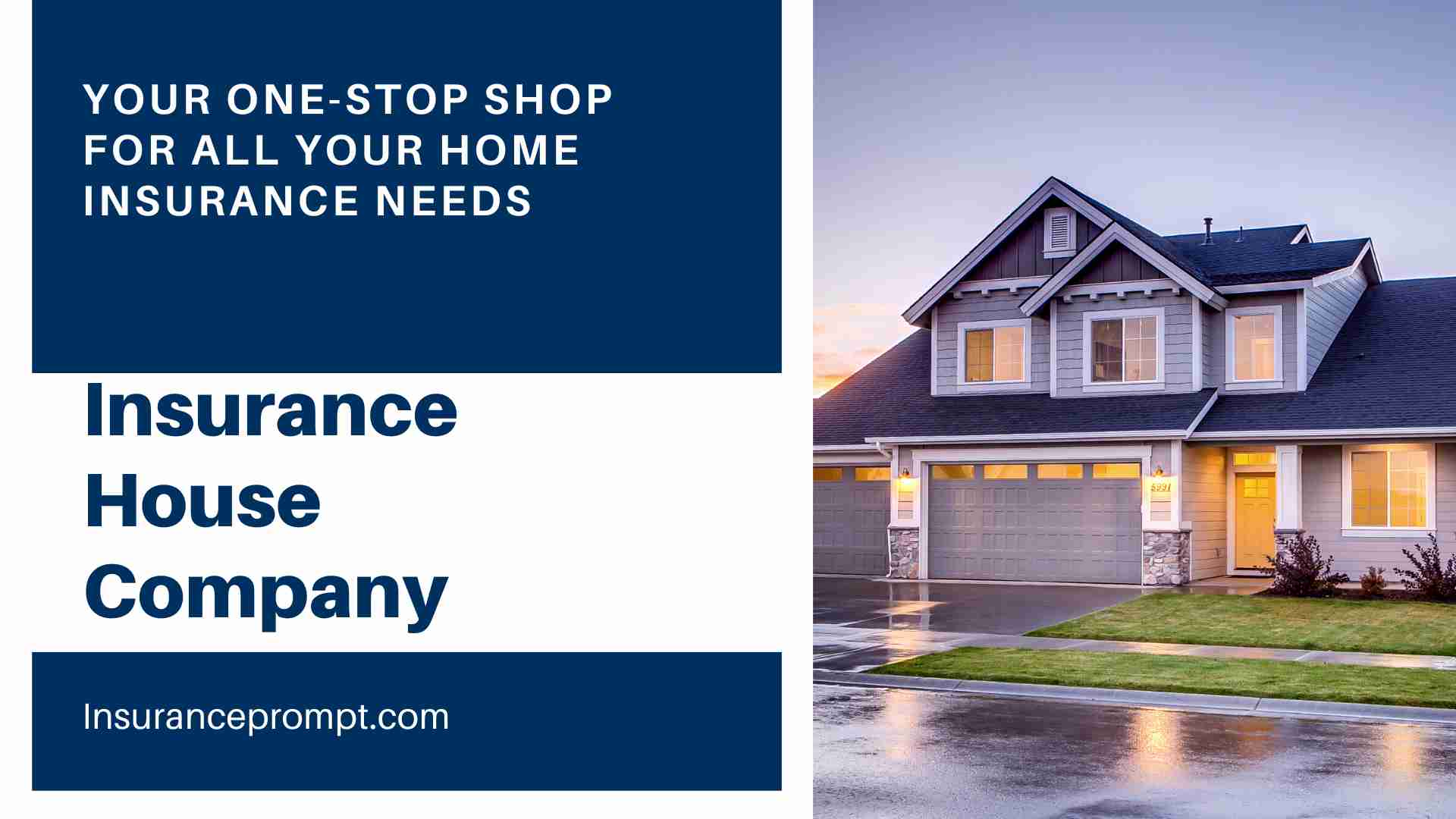Introduction
Are you searching for an insurance house company that provides top-notch homeowners insurance coverage? Look no further! As a homeowner, it’s crucial to have insurance coverage to protect your property from unexpected events that could potentially result in loss or damage. With so many home insurance companies, finding the one that best fits your needs can be challenging.
However, our team of experts has done the work for you! We’ve reviewed and compared the best home insurance companies of 2023 to help you choose the best homeowners insurance policy for your unique needs. Whether you’re looking for the cheapest homeowners insurance or the best home and auto insurance bundles, we’ve got you covered.
Plus, we make it easy to compare home insurance rates and get a home insurance quote. So, if you’re serious about finding the best homeowners insurance coverage, read on!
Key Takeaways
- Homeowners insurance is important for protecting your property from unexpected events that could result in loss or damage.
- Finding the right insurance company that fits your unique needs can be challenging.
- The Insurance House Company is a good option for those seeking top-notch homeowners insurance coverage.
- The company provides a team of experts who have reviewed and compared the best home insurance companies in 2023, making finding the best policy for your needs easier.
- They offer the best coverage at the best price, including home and auto insurance bundles.
- They make it easy to compare home insurance rates and get a home insurance quote.
- Working with an independent insurance agency like Insurance House Company can help you find the right insurance and the best coverage for your home loan.
Table of Contents
What is homeowners insurance?
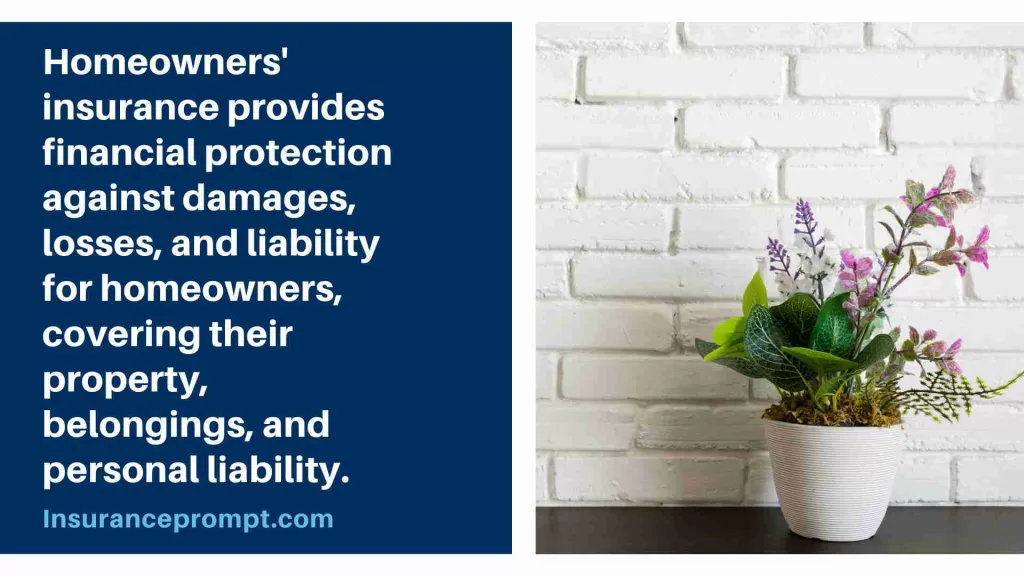
Homeowners insurance is a type of property insurance that provides financial protection to homeowners against damages and losses to their house and personal assets, as well as liability coverage for harm to others. Homeowners’ insurance policies generally cover destruction and damage to a residence’s interior and exterior, the loss or theft of possessions, and personal liability for harm to others.
The coverage typically includes protection from various perils, such as fire, theft, and severe weather. In the event of a covered loss, homeowners can file a claim with their insurance company and receive funds to cover the cost of repairs or replacements minus a deductible that they have chosen.
Basic homeowners insurance policies usually include six main coverages: dwelling, other structures, personal property, loss of use, liability, and medical payments. Homeowners insurance ensures that homeowners may rebuild their homes and replace the items inside them should something go wrong.
Do I need homeowners insurance?
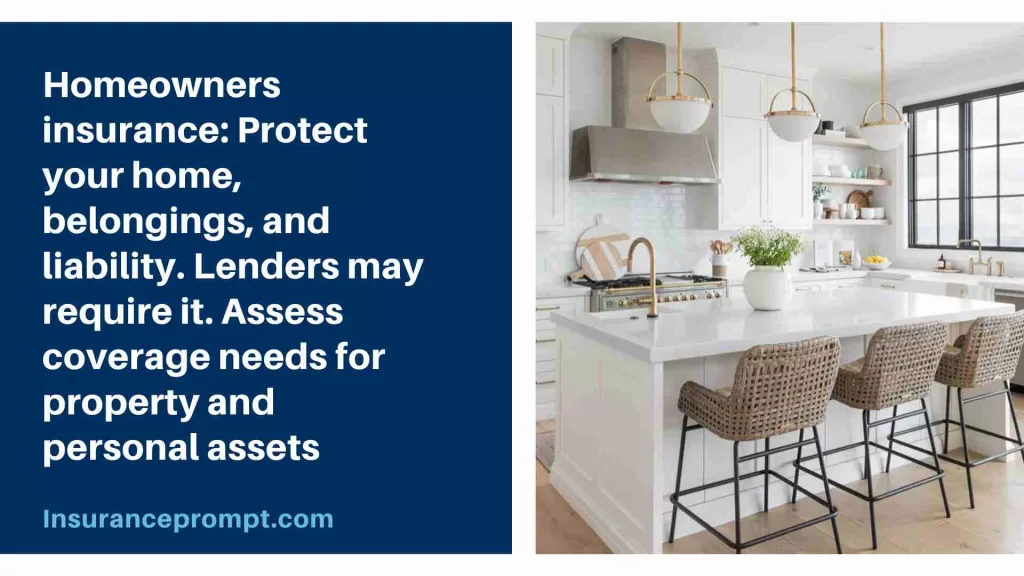
Homeowners’ insurance is not required by law in most states. However, protecting your home and personal assets from unforeseen circumstances such as theft, fire, and natural disasters is highly recommended. Mortgage lenders may require homeowners insurance as a condition for approving a loan.
Homeowners should consider the cost of repairing or rebuilding their homes and replacing personal assets in the event of a loss. Insurance companies generally recommend coverage for 50% to 70% of the insurance on the home’s structure.
Liability coverage is also recommended to protect assets if someone is injured on the property. Homeowners should keep an inventory of personal property and determine how much coverage they need for additional living expenses. Insurance carriers may offer discounts for bundling policies, installing smart home technology, or having a green home.
How many homeowners insurance coverage do I need?
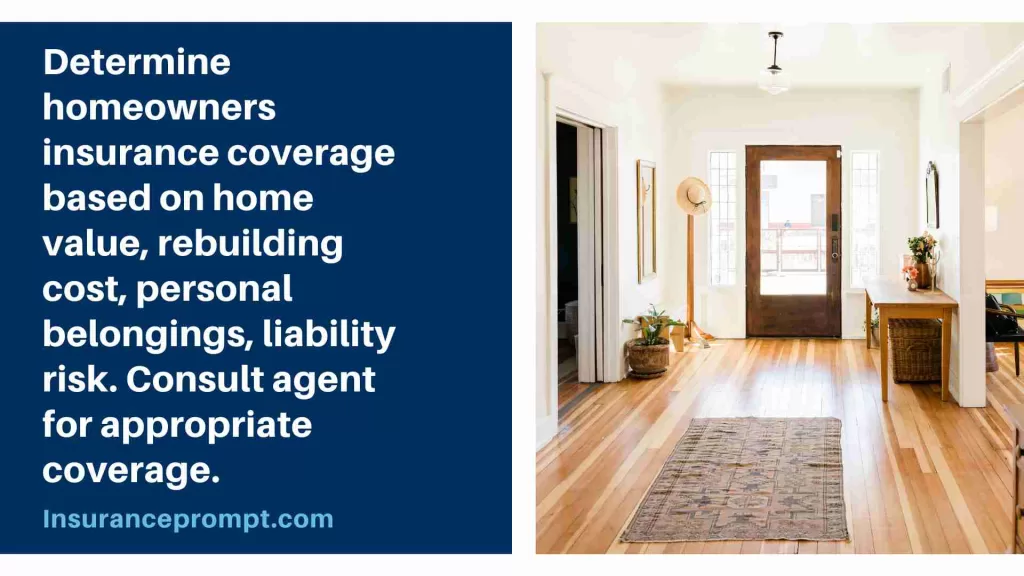
The amount of homeowners insurance coverage you need depends on various factors, such as the value of your home, the cost of rebuilding it, the value of your personal belongings, and your liability risk. The recommended amount for liability coverage is between $300,000 to $500,000, but some policies may offer as low as $100,000.
However, you may consider additional liability coverage if you have a high net worth. As for property coverage, it’s recommended that you insure your home for the cost of rebuilding it, which can be different from the market value.
If your policy offers insufficient coverage, you will be responsible for paying the remaining amount. A coverage of 50% to 70% of your dwelling coverage is recommended for personal belongings. The average cost for homeowners insurance is $1,272 per year for HO-3 policies. It’s best to consult an insurance agent to determine the right coverage for your needs and circumstances.
The Insurance House Company, Inc.
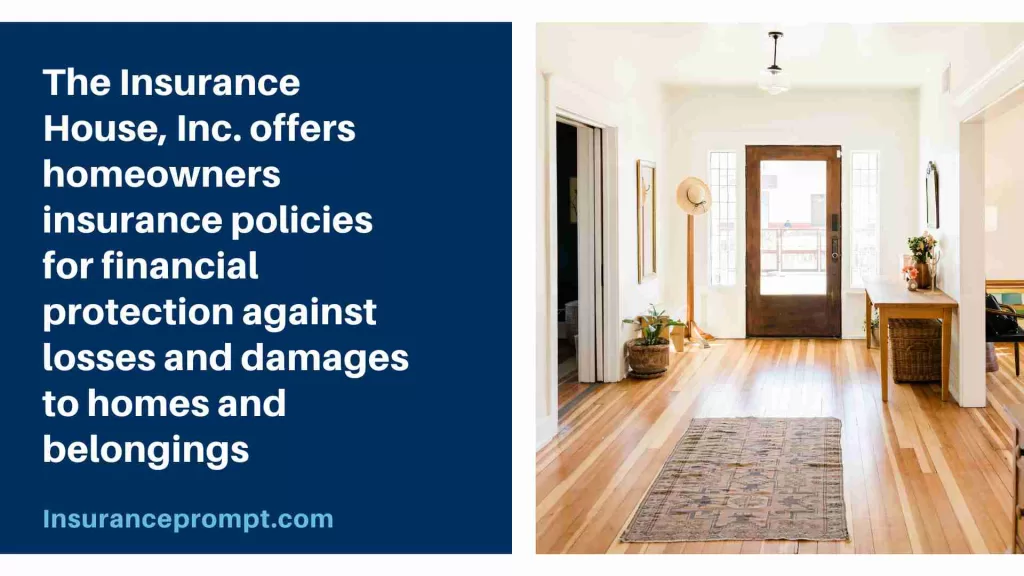
The Insurance House, Inc. is a homeowners insurance company that provides financial protection to homeowners against losses and damages to their homes and belongings caused by unforeseen events such as fires, thefts, and natural disasters. As with any insurance, the policyholder pays a premium to the insurance company for this protection.
The Insurance House, Inc. offers a variety of homeowners insurance policies to fit the needs and budgets of different homeowners. These policies may cover the dwelling, personal property, liability, and additional living expenses if the homeowner is forced to vacate their home temporarily due to covered losses.
The cost of homeowners insurance may depend on several factors, such as the location and age of the house, the value of the personal property, and the homeowner’s claims history. Understanding how insurance works and choosing the policy that best suits your needs is essential.
Overall, homeowners insurance from The Insurance House, Inc. can provide peace of mind to homeowners, knowing they are financially protected in case of unexpected events that may cause damage to their homes and belongings.
What Does Home Insurance Cover?
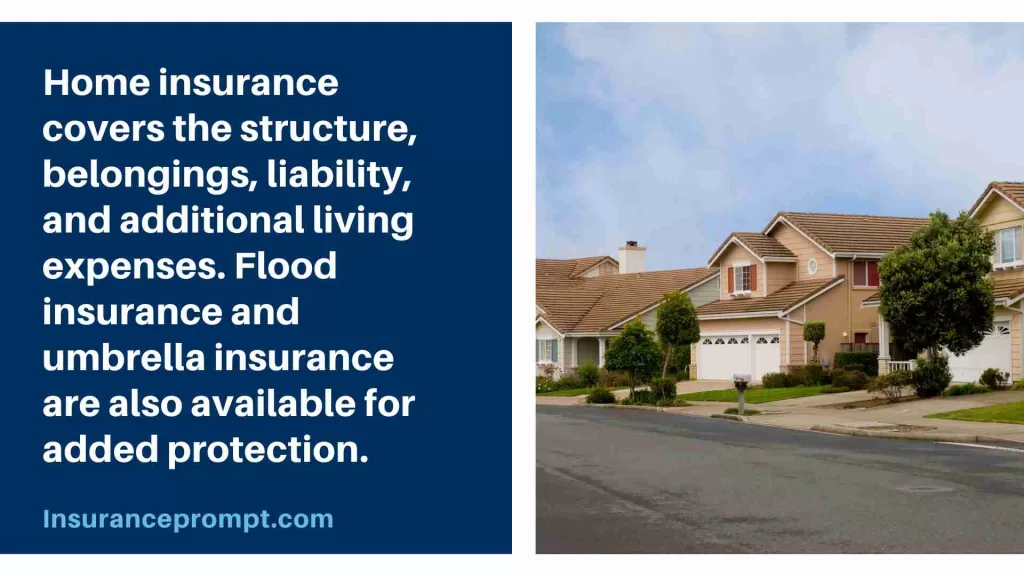
Home insurance is a type of insurance that provides financial protection for your home and personal belongings against loss, damage, and theft. It typically consists of two parts: buildings insurance and contents insurance.
Buildings insurance covers the physical structure of your home, including walls, floors, roofs, and windows, while contents insurance covers personal possessions, such as furniture, electronics, and clothing.
Home insurance also typically covers damages caused by specific events like fires, explosions, lightning strikes, windstorms, and water damage caused by sudden and accidental events, such as burst pipes.
Liability coverage is usually included in case someone is injured on your property, and some policies may include legal expenses cover for things like disputes with your employer or neighbor, faulty goods or services, or injuries.
It’s essential to understand what your specific home insurance policy covers, as policies can vary significantly between providers and may have limitations and exclusions. Review your policy documents carefully and contact your insurance provider with any questions or concerns.
Flood insurance coverage
Flood insurance is a financial product that covers damages caused by floods. Floods can cause substantial damage to real property owners, resulting in significant financial losses.
Flood insurance can be purchased through various providers. It can cover losses directly caused by floodings, such as excess water on land that is normally dry, hurricane storm surges, heavy downpours, and mudflows.
Most homeowners insurance policies do not cover flood damage, making flood insurance a crucial coverage to consider for property owners.
FEMA manages the National Flood Insurance Program (NFIP) and provides flood insurance to the public through a network of more than 50 insurance companies and the NFIP Direct.
The coverage limits for residential properties can go up to $250,000 for the building and $100,000 for the building contents, while commercial properties can secure coverage up to $500,000.
Flood insurance typically has separate deductibles for the building and contents and may have purchase requirements, so reviewing coverage details and limits is essential.
The cost of flood insurance can vary based on location, risk, and coverage limits, but the average annual premium in the US was $1,272 in 2019. Reviewing coverage details and purchasing adequate protection to ensure financial security in flood is important.
Dwelling Coverage
Dwelling coverage, also known as dwelling insurance, is a type of home insurance policy that covers the physical structure of your home and attached structures from damages caused by covered perils. It includes the walls, roof, flooring, built-in water heaters, and other parts of the home in which you live.
Generally, dwelling coverage is designed to cover your home’s replacement costs without applying depreciation for wear and tear.
Experts recommend that homeowners purchase dwelling coverage equal to 100% of the replacement cost of their homes. The average cost of homeowners insurance in the U.S. is $1,899 per year for a policy with $300,000 in dwelling coverage, as homes are expensive to insure and carry a relatively high risk of loss.
It’s important to note that dwelling coverage is just one piece of a home insurance policy. Other coverage types include other structures on your property, personal property/contents, loss of use, personal liability protection, and medical payments.
In terms of covered perils, dwelling coverage tends to cover fire and smoke damage, theft and vandalism, aircraft and automobile damage, wind damage, and damage caused by the weight of snow or ice. Reviewing your policy to understand what perils are covered and excluded from your coverage is essential.
Liability Insurance
Liability insurance is a type of insurance policy that protects individuals and businesses from the risk of being held legally responsible for an accident, injury, or damage to property. It covers financial losses if the insured is liable and must compensate the injured party.
Homeowners, renters, and condo insurance typically include basic property liability coverage, while most states require auto liability insurance.
Commercial general liability insurance protects businesses against legal claims for bodily injury or property damage arising from their operations, products, or services. An insurer issues this policy, and it may be subject to exclusions and limitations. Employers may also provide directors’ and officers’ liability insurance to cover their employees.
Liability insurance can provide individuals and businesses peace of mind and financial security. It is important to carefully review the terms and conditions of a liability insurance policy to ensure that it meets specific needs and covers potential risks.
Umbrella Insurance
Umbrella insurance is an additional layer of liability coverage that exceeds the limits of regular homeowners, auto, or watercraft policy coverage. It protects against lawsuits or claims that exceed the limits of your primary insurance policies. This type of insurance can cover you and members of your household against claims or lawsuits for injuries or property damage you may have caused and legal costs to defend you in related lawsuits.
Umbrella insurance benefits those with significant assets to protect but can benefit anyone who wants extra protection against unexpected and potentially costly events. The cost of umbrella insurance varies, but the Insurance Information Institute reports that it ranges from $150 to $300 per year for $1 million in coverage.
When looking for an umbrella insurance policy, it’s essential to consider factors such as the amount of coverage you need, the insurance company’s financial strength, and any exclusions or limitations in the policy. Some of the best umbrella insurance companies include Liberty Mutual, Chubb, USAA, and Travelers.
What Isn’t Covered by Homeowners Insurance?
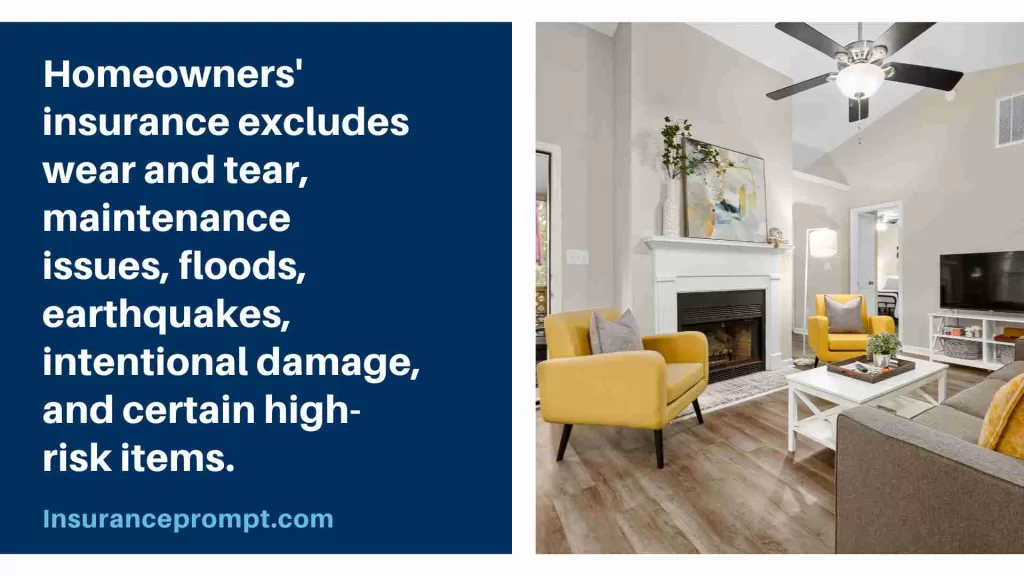
Homeowners insurance typically covers a broad range of possible damages, but some instances don’t provide coverage. First, most homeowners’ insurance policies do not cover damage caused by normal wear and tear or lack of maintenance.
This includes mold, infestations, water damage, and sewer backup incidents. Floods and earthquakes are not typically covered, but homeowners can purchase additional policies to cover these perils.
Additionally, homeowners insurance does not cover intentional acts of damage or criminal activity. Liability coverage is also limited to incidents that occur on the property. For example, if a homeowner causes injury or damage while driving their car, their car insurance policy must provide coverage.
Homeowners’ insurance may also exclude coverage for certain high-risk items, such as pools or trampolines, or require higher premiums for their coverage. Understanding what is and isn’t covered by homeowners insurance is important for homeowners to ensure they have the appropriate coverage for their needs.
Best Homeowners Insurance Policy in 2023

Homeowners’ insurance is an important investment to protect their property and personal belongings. The best homeowners insurance policy in 2023 varies depending on individual needs and circumstances, but some top-rated options include USAA, State Farm, Amica Mutual, Chubb, and Nationwide.
USAA is a great option for military personnel and veterans, while State Farm is known for excellent customer satisfaction. Amica Mutual is often considered the best general insurer, and Chubb is ideal for high-limit policies.
Nationwide is a great choice for high-value homes, while Chubb is known for exceptional coverage for fallen trees after a storm, lock replacement, and electronic data restoration.
It’s important to note that rates can vary significantly based on location, home value, and coverage needs. Homeowners should compare policies and rates from multiple insurers before making a decision.
Other factors to consider include deductibles, coverage limits, and available discounts. Reviewing policies annually to ensure adequate coverage and make any necessary updates is also important.
How Much Is Homeowners Insurance?
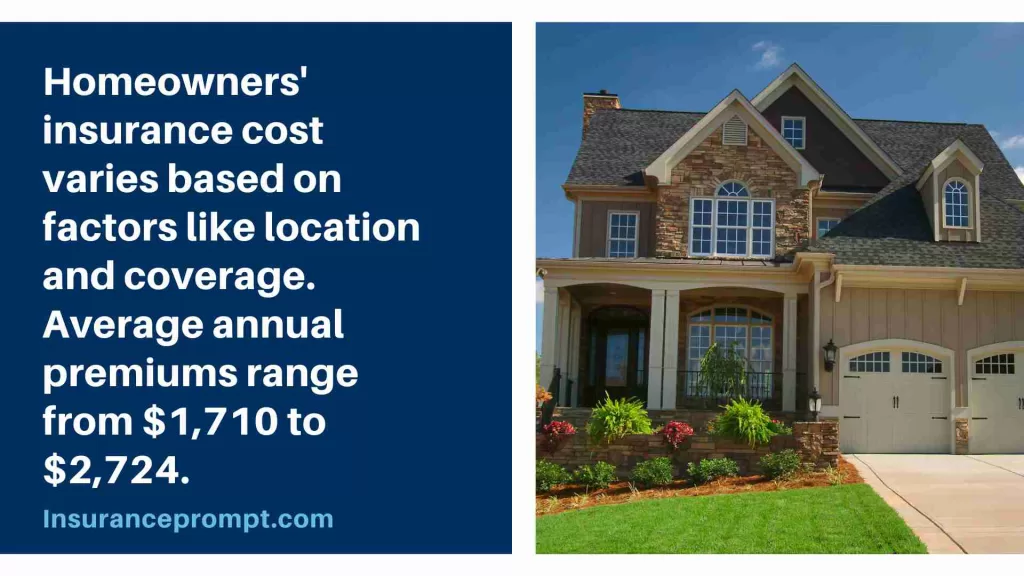
Homeowners’ insurance cost varies depending on several factors like location, dwelling coverage, deductible, personal property coverage, liability coverage, and the type of coverage you choose. According to Forbes, most insurance companies will provide coverage for 50% to 70% of the amount of insurance you have on the structure of your home.
The default amount for replacing personal property is usually 50% of the dwelling insurance. So, if you have $300,000 in dwelling coverage, this would provide $150,000 for replacing belongings, which may not be sufficient for some homeowners.
According to Forbes, the average cost of homeowners insurance is $1,710 per year for a $350,000 dwelling limit with a $500 deductible. However, the cost of coverage varies depending on various factors, such as location, the age of your home, the size of your property, and the type of coverage you choose.
Homeowners insurance is not expensive; in most cases, you can get coverage for less than $100 per month. The average cost of homeowners insurance premiums is $2,724 per year, based on Insurify data. Homeowners’ insurance costs are rising partly due to supply chain issues from the pandemic.
However, the actual amount can vary depending on numerous factors, like your location and the coverage you choose. You can use a homeowners insurance cost calculator to estimate quickly and accurately.
All you need to do is provide brief details about your home, including its address, square footage, and built year. You’ll also receive homeowners insurance estimates from multiple insurance companies.
How Are Homeowners Insurance Rates Determined?
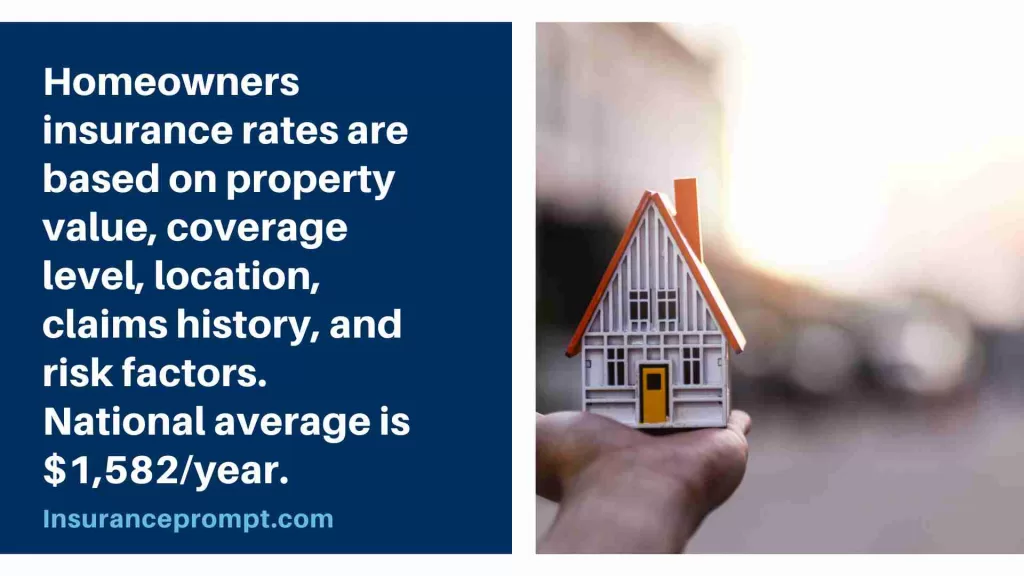
Homeowners’ insurance rates are determined by various factors, including the property’s value, the level of coverage, location, and the homeowner’s claims history.
Insurance companies use different methods to calculate premiums, but most use a combination of factors to determine the appropriate rate for each homeowner. According to the Insurance Information Institute, most insurance companies will provide coverage for 50% to 70% of the amount of insurance you have on the structure of your home.
What Factors Affect Homeowners Insurance Rates?
One of the key factors in determining homeowners insurance rates is the level of risk that the homeowner poses. This includes factors such as the likelihood of natural disasters in the area, the neighborhood’s crime rate, and the property’s age and condition. Insurance companies also consider the homeowner’s claims history, which can affect rates in the future.
Insurance companies use home insurance calculators to determine rates, categorizing policyholders by area and risk exposure. Online calculators can help homeowners estimate the coverage they need and provide a quote after answering questions about their home’s location, square footage, heating systems, construction, and other features.
Homeowners should also be aware of deductibles, which must be exceeded before the insurance company’s coverage takes effect. According to a recent analysis, the national average cost of homeowners insurance is $1,582 per year, with rates varying widely across the country depending on coverage needs and location.
Compare the Best Home Insurance Companies of 2023

When protecting your home, having the right home insurance is crucial. With so many options available, it can be difficult to determine which insurance company is the best for you. Here are some of the best home insurance companies of 2023:
- American Family: This company is great for extended coverage for dwellings. They offer customizable policies with additional coverage options like identity theft and home business coverage.
- Nationwide: This company is great for high-value homes. They offer guaranteed replacement cost coverage and discounts like claims-free and home renovation discounts.
- State Farm: With a century-long run in the insurance industry, State Farm is a great option for home insurance. On a recent J.D. Power survey, they received above-average customer satisfaction ratings for purchasing home insurance.
- AIG: This company offers coverage for building and renovation, making it a good option for those who need to insure their property’s building structure. They also offer customizable policies with additional coverage options like worldwide coverage and valuables protection.
- FWD: This company offers a 25% discount on their premium when using the promo code HOME25. They also provide complimentary Cyber Insurance Coverage for online shopping fraud and fraudulent electronic transfers of $5,000 for each benefit upon purchase of FWD Home Insurance.
To make it easier to compare these companies, we’ve created a table summarizing their strengths:
| CompanyStrengths
American FamilyGreat for extended coverage for dwellingsNationwideGreat for high-value homesState FarmCentury-long run in the insurance industryAIGCoverage for building and renovationFWDDiscounted premium and complimentary Cyber Insurance Coverage Compare the Best Home Insurance Companies of 2023 It’s important to research and compare different policies to find the best home insurance company for your specific needs and budget. Which home insurance company has the lowest complaint index?Nationwide and Chubb are among the insurance companies with the lowest complaint index for home insurance. The National Association of Insurance Commissioners (NAIC) Complaint Index considers the number of complaints an insurer receives and its size. Nationwide had the fewest complaints among the top car and home insurers. Meanwhile, Chubb had the lowest complaint index for home insurance. According to JD Power’s claims rating, USAA had the lowest complaint index for homeowners insurance, followed by Amica and State Farm. It is worth noting that while some insurance companies may have lower complaint indices, they may not necessarily offer the cheapest rates or best customer service. For example, while Allstate has some of the cheapest home insurance rates, it underperforms in JD Power’s home insurance survey and has a higher complaint index than its competitors. The type of insurance policyholders had the most complaints about was accident and health insurance, followed by auto insurance, while there were fewer complaints about homeowners insurance. Cheapest Homeowners Insurance in 2023As of May 2023, there are several options for cheap homeowners insurance. According to Forbes, Progressive Home Insurance and Westfield Home Insurance are among the cheapest options. However, NerdWallet’s analysis states that State Farm has the cheapest annual home insurance, averaging $1,500 among large insurers. CNBC also suggests First Tech Federal Credit Union as a cheap option for homeowners insurance. In addition to the above, Bankrate’s research points to eight companies that offer competitive rates for homeowners with good credit. Nationwide also provides a range of coverage options, including separate policies for homes in gated communities and condos in buildings with 24/7 security. Safehome.org lists Lemonade and State Farm as the best options for cheap homeowners insurance due to their affordable rates and exceptional customer service. It is important to note that the cheapest insurer may vary based on location and coverage level, as highlighted by MoneyGeek. While the average homeowners’ insurance premium is $2,724 annually, homeowners should explore options to find the most cost-effective and suitable coverage for their needs. Best Home and Auto Insurance Bundles of 2023 As per the research conducted in 2023, several insurance companies offer the best home and auto insurance bundles, which can save policyholders a significant amount of money. Among them, State Farm is considered the leading provider, with an average savings of 23% per year. USAA is another excellent option, with benefits and coverage specifically for military members, veterans, and their immediate families. Policyholders can save up to 10% when they bundle their home and auto insurance policies. Amica is also great for those who bundle their home and auto insurance policies. The company offers excellent customer satisfaction and has low consumer complaints. Liberty Mutual, Allstate, and Progressive are other providers with a wide range of special discounts for different policyholders, multiple bundle types, and superior claim processing. Other providers that offer competitive home and auto insurance bundles include Nationwide, Erie, and Geico. When choosing the best home and auto insurance bundle, comparing bundling discounts from multiple companies is essential. Additionally, consider factors such as customer satisfaction, coverage, benefits, and claim processing when making a final decision. How To Buy Homeowners InsuranceHomeowners insurance covers damages to your home and personal property and liability protection. Here are some steps to follow when purchasing a homeowners insurance policy: First, determine the type and amount of coverage you need based on your home’s value, location, and potential risks. Next, compare quotes from different insurance providers to find the best coverage options and rates. Consider the reputation and financial stability of the insurance company before making a purchase. Also, take advantage of available discounts, such as bundling with other insurance policies, installing safety features, or buying online. Review the policy documents carefully and understand the deductibles, coverage limits, and exclusions. Finally, regularly review and update your policy to meet your changing needs and circumstances. Find the Best Homeowners Insurance in Your State Finding the best homeowners insurance in your state can be daunting, but it is essential to protecting your home and belongings. There are several factors to consider when shopping for homeowners insurance, such as coverage options, customer service ratings, discounts, financial strength, and online tools and resources. One of the best ways to find the best homeowners insurance in your state is by researching online. Forbes and The Insurance Bulletin list the best homeowners insurance companies in the country, while Simply Insurance offers state-specific reviews and tips on getting homeowners insurance. NerdWallet also provides the average annual home insurance costs in different states, including New York. Another important aspect to consider when choosing a homeowners insurance company is customer satisfaction. J.D. Power conducts surveys on thousands of homeowners annually, and some insurance companies are J.D. Power Award winners, indicating excellence in customer service. It is also important to note that the coverage you need may vary depending on your location and the value of your home and belongings. The Insurance Information Institute recommends having at least $300,000 in coverage, and purchasing an umbrella policy may provide additional coverage for a few hundred dollars more in your annual premium. In conclusion, finding the best homeowners insurance in your state involves thorough research, considering customer satisfaction and coverage needs. Online resources such as Forbes, The Insurance Bulletin, Simply Insurance, J.D. Power, and NerdWallet can help guide you toward the best options. Ready to start a homeowners quote online? If you are ready to start a homeowners quote online, several resources are available. The average cost of a homeowners insurance policy in the U.S. is approximately $1,250 per year. To get a quote online, you can visit comparison sites such as Insurance Geek and request quotes from multiple companies simultaneously. State Farm agents can also help you with questions about your homeowners insurance quote. Online quote templates and generators are available, such as those provided by Free Invoice Builder, which can help you provide an agreed pay rate, labor, and manufacturing material resources. Additionally, Hubspot offers pre-approval email templates to prospective buyers and open house and showing follow-up email templates. In terms of real estate investment, RealWealth co-founder and co-CEO Kathy Fettke say that investing in real estate is a smart choice because the property is tangible, and people will always need shelter. For those looking to sell their homes, The Close offers a real estate email template designed to entice homeowners by inviting them to review their potential profit opportunities over coffee. Overall, starting a homeowners quote online is an easy and accessible process, with many resources to guide you. Additional Types of Insurance QuotesThere are several types of homeowners insurance policies available in the market. The most common policy type is the HO-3 Special Form policy, which offers coverage for all perils except for a few exclusions, such as flood, earthquake, and war/nuclear incidents. Additionally, the HO-5 policy provides the broadest coverage of all policy types. It covers personal belongings such as jewelry, furs, watches, goldware, silverware, and firearms in case of damage, theft, loss, or misplacement. Other policy types include the Basic Form (HO-1), which covers only a handful of potential problems, such as fire, smoke, and explosions, and the Broad Form (HO-2), which covers more than the basic form but less than the special form policy. When looking for additional types of homeowners insurance quotes, it is essential to consider each policy type’s coverage limits and exclusions. Homeowners can get quotes online or by contacting insurance companies directly. Insurance companies also use insurance quote templates to provide potential customers with information on rates and coverage. Choosing a policy that meets your specific needs and provides adequate protection for your home and personal belongings is crucial. How to File a Homeowners Insurance Claim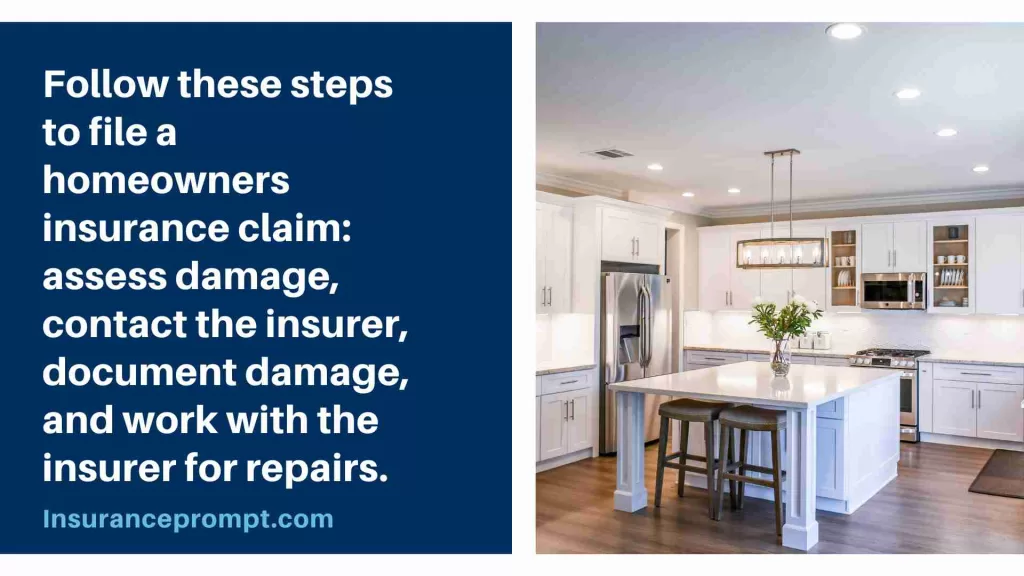 If you experience damage to your home, filing a homeowners insurance claim can help cover repairs or replacement costs. The following steps can help guide you through filing a claim. First, assess the damage to your property. This will help you determine whether filing a claim is necessary and the extent of the damage that needs to be repaired. If your home was burglarized or vandalized, file a police report and keep a copy for your insurance claim. Next, contact your insurance company immediately after the damage occurs. Most policies do not have a specific time limit for filing a claim but require timely property damage reporting. Be prepared to provide details about the damage and its circumstances, including when it occurred and any relevant details that may have contributed to it. Document the damage with photos and videos from multiple angles, and inventory any damaged or stolen items. Keep copies of all receipts and invoices for the damage and repair work. Read your policy carefully to understand what is covered and your deductible. Finally, work with your insurance company to arrange for repairs or replacement of damaged items. Depending on the nature of the damage, you may be required to obtain estimates or bids from contractors or service providers. Be wary of paying for repairs in full or signing a contract before the work is complete and you are satisfied with the quality. By following these steps and working closely with your insurance company, you can help ensure that your homeowners’ insurance claim is processed smoothly and that you receive the necessary funds to repair or replace your damaged property. How can I prevent claims at my home?Preventing claims at home is essential to maintain a safe and secure environment. To prevent water damage, check for any leaks and correct any grading issues that may cause water to pool around the foundation of your property. Regularly inspect gutters and downspouts to ensure proper water flow and clean them to prevent blockages. To prevent theft, it’s important to lock doors and windows, install security systems, and avoid leaving valuable items in plain sight. A claim for stolen items can easily run into thousands of dollars, so prevention is key. Homeowners can also prevent claims by avoiding dangerous activities, such as using candles or smoking indoors, and maintaining a safe environment by fixing tripping hazards or faulty electrical wiring. Also, proper home maintenance, including cleaning gutters, trimming trees, and repairing roofs, can prevent damage from wind and hail. Finally, it’s important to report any damage or incidents to the insurance company immediately to avoid any potential issues with delayed reporting. ConclusionIn conclusion, choosing the right insurance house company is essential for protecting your home and personal belongings. With the rise of online home insurance, it’s easier than ever to compare home insurance quotes online and find the best coverage at the best price. When looking for home insurance, it’s important to research and considers the top home insurance companies and an independent insurance agency that can help you find the best coverage to meet your unique needs. By shopping around and comparing options, you can ensure you have the right insurance to protect your home, even if you have a home loan. Don’t hesitate to seek help from experts to find the right insurance for your home and peace of mind. FAQsWhat are the types of homeowners insurance?Several types of homeowners insurance include HO-1, HO-2, HO-3, HO-4, HO-5, and HO-6 policies. HO-1 and HO-2 policies are basic and named-peril policies, respectively. HO-3 policies are the most common and cover damage to the house and personal property from all perils except those explicitly excluded. HO-4 policies are designed for renters, while HO-5 policies are comprehensive policies that offer broader coverage than HO-3 policies. HO-6 policies are designed for condominium owners and cover their personal property and any parts of the unit that they own. How much does a homeowners insurance policy cost?The cost of a homeowners insurance policy depends on several factors, including the home’s value, the home’s location, the home, the age of the home, the type of coverage selected, and the insurer’s underwriting criteria. The average annual premium for a homeowners insurance policy in the United States is $1,445, but this can vary significantly depending on the abovementioned factors. What is the 80% rule in homeowners insurance?The 80% rule in homeowners insurance requires homeowners to insure their homes for at least 80% of their replacement cost value. If homeowners do not insure their home for at least 80% of its replacement cost value, they may not receive full reimbursement for a claim. For example, if a home has a replacement cost value of $300,000 and the homeowner only insures it for $200,000, they may only receive 66.6% of a covered claim. Does homeowners insurance cover damage from flooding?Standard homeowners insurance policies do not cover damage from flooding. However, homeowners can purchase a separate flood insurance policy through the National Flood Insurance Program (NFIP) or a private insurer. It’s important to note that there is typically a waiting period of 30 days before flood insurance coverage goes into effect, so homeowners should plan accordingly. Does homeowners insurance cover damage from earthquakes?Standard homeowners insurance policies do not cover damage from earthquakes. However, homeowners can purchase a separate earthquake insurance policy to cover earthquake damage. Earthquake insurance policies are unavailable in all areas, so homeowners should check with their insurers to see if this coverage is available. Does homeowners insurance cover mold?It depends on the cause of the mold. If the mold is caused by a covered peril such as water damage, your homeowners insurance may cover the remediation cost. However, if a lack of maintenance or upkeep causes the mold, it is typically not covered. Does homeowners insurance cover storm damage?Yes, storm damage is typically covered by homeowners insurance. This includes damage caused by wind, hail, lightning, and other natural disasters. Can home insurance companies raise your premium?Yes, home insurance companies can raise your premium if you file a claim or if there is a change in the risk factors associated with your property. However, some states have regulations limiting how much insurance companies can raise your rates. Do home insurance companies check your credit?Yes, home insurance companies may check your credit as part of the underwriting process. This is because there is a correlation between credit scores and the likelihood of filing a claim. Can the home insurance company ask for money back?Yes, if you cancel your policy before the end of the term, the insurance company may ask for a portion of the premium back. Can a home insurance company drop you?Yes, a home insurance company can drop you if you file too many claims or if there is a significant change in the risk factors associated with your property. Which home insurance company is the cheapest?It depends on your specific situation, but some of the cheapest home insurance companies include State Farm, Allstate, and Farmers. Which home insurance companies are the best?It depends on your specific situation, but some of the best home insurance companies include Amica, Chubb, and USAA. Which home insurance company is best at paying claims?According to the 2022 J.D. Power Home Insurance Study, Amica and Nationwide are the top performers regarding customer satisfaction with the claims process. Which home insurance company has the highest customer satisfaction?Amica and Nationwide received the highest overall customer satisfaction scores. Which home insurance company has the best customer service?According to J.D. Power’s 2021 U.S. Home Insurance Study, USAA and Erie Insurance have the highest scores for customer service. What home insurance companies are in Florida?There are several home insurance companies in Florida. Some of the most popular ones are State Farm, Allstate, Geico, Progressive, Liberty Mutual, and Nationwide. Other options include Tower Hill, Federated National, and Heritage Property & Casualty Insurance Company. Remember that not all insurance companies operate in all areas of Florida, and some may offer coverage only for certain types of homes or risks. It’s important to shop around and compare quotes to find the right coverage for your needs. What home insurance companies allow pit bulls?Not all home insurance companies allow coverage for homes with pit bulls or other so-called “dangerous” breeds. However, some companies are more pit bull-friendly than others. For example, State Farm and Farmers Insurance are known to offer coverage for homes with pit bulls in some states. Additionally, specialty insurance companies, such as the American Pit Bull Foundation and the United States Dog Registry, offer liability coverage specifically for pit bull owners. It’s important to check with individual insurance companies to see if they offer coverage for pit bulls or other restricted breeds. Who owns United Home Insurance Company?United Home Insurance Company is a subsidiary of United Insurance Holdings Corp, a property and casualty insurance company based in St. Petersburg, Florida. The company was founded in 1999 and is publicly traded on the NASDAQ exchange under the ticker symbol UIHC. United Home Insurance Company offers a range of homeowners insurance policies in several states, including Florida, South Carolina, and Massachusetts. Which home insurance company is the best in Canada?The best home insurance company in Canada depends on various factors, including the type of coverage you need, your area, and your budget. Some of Canada’s most popular home insurance companies include Intact Insurance, Aviva Canada, TD Insurance, and Desjardins Insurance. These companies offer a range of coverage options and discounts, such as bundling with auto insurance, loyalty discounts, and claims-free discounts. It’s important to compare quotes from multiple insurers to find the best coverage for your needs. Which home insurance company is the best in Australia?The best home insurance company in Australia also depends on various factors, including the level of coverage you need, the location and type of your property, and your budget. Some of Australia’s most famous home insurance companies include NRMA Insurance, RACQ, Allianz, and Suncorp. These companies offer different coverage options, such as building insurance, contents insurance, and combined policies. It’s important to compare quotes and read reviews from other customers to find the best home insurance company for your needs. Which home insurance company is the best in the UK?Like Canada and Australia, the best home insurance company in the UK depends on various factors, including the type of coverage you need, your area, and your budget. Some UK’s most popular home insurance companies include Aviva, Direct Line, Admiral, and Churchill. These companies offer different coverage options, such as building insurance, contents insurance, and combined policies. It’s important to compare quotes and read reviews from other customers to find the best home insurance company for your needs. Do home insurance companies share claims history?Yes, home insurance companies share claims history. Most insurance companies provide information to a national property claim database called the Comprehensive Loss Underwriting Exchange (CLUE), which is run by Lexis Nexis, and contains claims data from more than 99% of home insurance companies. The CLUE report records claims history for up to seven years and includes information about the subject of the claim, what caused the damage, the amount paid by the insurer, and other such details. ReferencesHomeowners Insurance – SOFNALL. https://sofnall.com/homeowners-insurance/ Homeowners Insurance Guide: A Beginner’s Overview – Investopedia. https://www.investopedia.com/insurance/homeowners-insurance-guide/ Top 5 Homeowners Insurance Claims & How to Prevent Them. https://apexinsurancetoday.com/common-homeowners-insurance-claims/ Can a Property Owner File a Claim Against the Contractor’s … – Procore. https://www.procore.com/library/property-owner-file-claim-against-contractors-insurance Insurance for Your House and Personal Possessions | III. https://www.iii.org/article/insurance-for-your-house-and-personal-possessions Protect Your Home: A Comprehensive Guide to Home Insurance in the USA. https://www.dev-krishna.com/2023/04/protect-your-home-comprehensive-guide.html Floods | Ready NC. https://www.readync.gov/stay-informed/north-carolina-hazards/floods Flood Risk Information | St. Bernard Parish, LA. https://www.sbpg.net/352/Flood-Risk-Information What Is a DP-1 Home Insurance Policy? | Explained by Hippo. https://www.hippo.com/learn-center/dp1-home-insurance What is dwelling coverage & how much do you need? https://www.policygenius.com/homeowners-insurance/what-is-dwelling-coverage/ Renters Insurance – Get A Free Quote Today | GEICO. https://www.geico.com/renters-insurance/ Hold Harmless Agreement Template – FormSwift. https://formswift.com/hold-harmless-agreement Umbrella Insurance: How It Works & What It Covers – NerdWallet. https://www.nerdwallet.com/article/insurance/umbrella-insurance Citizens Insurance Review 2023 | Bankrate. https://www.bankrate.com/insurance/reviews/citizens-insurance/ The Best Companies For Home and Auto Insurance Bundles. https://www.insuranceblogbychris.com/homeowners/best-providers/home-auto-bundles/ Best Homeowners Insurance in Albany – Policygenius. https://www.policygenius.com/homeowners-insurance/best-homeowners-insurance-in-albany/ Personal Liability Coverage | Bankrate. https://www.bankrate.com/insurance/homeowners-insurance/personal-liability-insurance/ Does Insurance Cover Windshield Replacement? Laws in the Different States. https://us-autoglass.com/blog/does-insurance-cover-windshield-replacement/ What Does Homeowners Insurance Cover in 2022? | Money. https://money.com/what-does-homeowners-insurance-cover/ Flood Insurance – Get a Flood Insurance Quote Online | GEICO. https://www.geico.com/flood-insurance/ Kreidler shouldn’t act alone on credit ratings. (2022, February 7). Columbian, Ax. Best homeowners insurance companies for May 2023 | Bankrate. https://www.bankrate.com/insurance/homeowners-insurance/best-home-insurance-companies/ Insurance tips – Discover everything you need to know in one place! https://www.orlodo.com/insurance/ WhiteHorse Finance, Inc. (NASDAQ: WHF) Receives … – Defense World. https://www.defenseworld.net/2023/05/14/whitehorse-finance-inc-nasdaqwhf-receives-consensus-recommendation-of-hold-from-analysts.html Do insurance companies know about previous claims? – InsuredAndMore.com. https://insuredandmore.com/do-insurance-companies-know-about-previous-claims When and How to Cancel Your Car Insurance Policy | Bankrate. https://www.bankrate.com/insurance/car/get-refund-cancel-car-insurance/ Latest posts by Alireza Farshadfard (see all)
Insurance House Company: Ultimate Guide for Homeowners |

